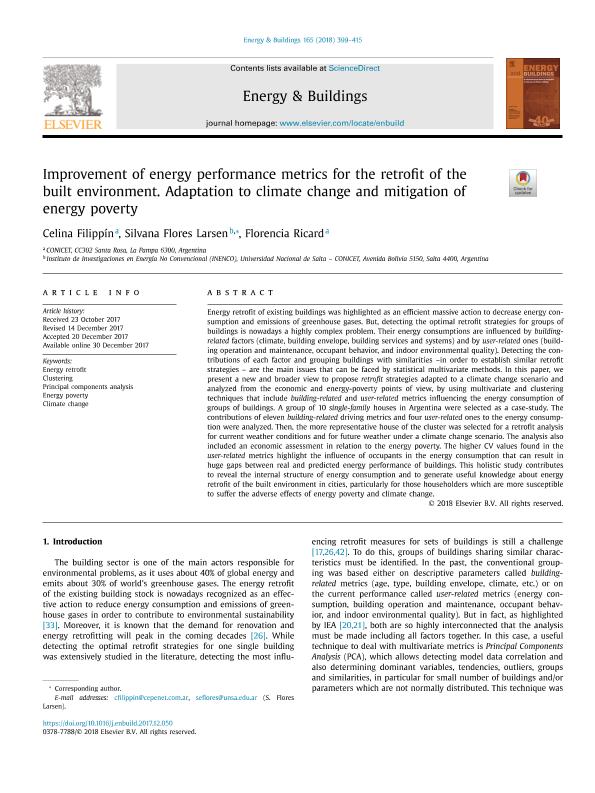Mostrar el registro sencillo del ítem
dc.contributor.author
Filippin, Maria Celina

dc.contributor.author
Flores Larsen, Silvana Elinor

dc.contributor.author
Ricard, Maria Florencia

dc.date.available
2019-12-26T15:17:13Z
dc.date.issued
2018-04
dc.identifier.citation
Filippin, Maria Celina; Flores Larsen, Silvana Elinor; Ricard, Maria Florencia; Improvement of energy performance metrics for the retrofit of the built environment: Adaptation to climate change and mitigation of energy poverty; Elsevier Science Sa; Energy and Buildings; 165; 4-2018; 399-415
dc.identifier.issn
0378-7788
dc.identifier.uri
http://hdl.handle.net/11336/92921
dc.description.abstract
Energy retrofit of existing buildings was highlighted as an efficient massive action to decrease energy consumption and emissions of greenhouse gases. But, detecting the optimal retrofit strategies for groups of buildings is nowadays a highly complex problem. Their energy consumptions are influenced by building-related factors (climate, building envelope, building services and systems) and by user-related ones (building operation and maintenance, occupant behavior, and indoor environmental quality). Detecting the contributions of each factor and grouping buildings with similarities –in order to establish similar retrofit strategies – are the main issues that can be faced by statistical multivariate methods. In this paper, we present a new and broader view to propose retrofit strategies adapted to a climate change scenario and analyzed from the economic and energy-poverty points of view, by using multivariate and clustering techniques that include building-related and user-related metrics influencing the energy consumption of groups of buildings. A group of 10 single-family houses in Argentina were selected as a case-study. The contributions of eleven building-related driving metrics and four user-related ones to the energy consumption were analyzed. Then, the more representative house of the cluster was selected for a retrofit analysis for current weather conditions and for future weather under a climate change scenario. The analysis also included an economic assessment in relation to the energy poverty. The higher CV values found in the user-related metrics highlight the influence of occupants in the energy consumption that can result in huge gaps between real and predicted energy performance of buildings. This holistic study contributes to reveal the internal structure of energy consumption and to generate useful knowledge about energy retrofit of the built environment in cities, particularly for those householders which are more susceptible to suffer the adverse effects of energy poverty and climate change.
dc.format
application/pdf
dc.language.iso
eng
dc.publisher
Elsevier Science Sa

dc.rights
info:eu-repo/semantics/openAccess
dc.rights.uri
https://creativecommons.org/licenses/by-nc-sa/2.5/ar/
dc.subject
CLIMATE CHANGE
dc.subject
CLUSTERING
dc.subject
ENERGY POVERTY
dc.subject
ENERGY RETROFIT
dc.subject
PRINCIPAL COMPONENTS ANALYSIS
dc.subject.classification
Otras Ingenierías y Tecnologías

dc.subject.classification
Otras Ingenierías y Tecnologías

dc.subject.classification
INGENIERÍAS Y TECNOLOGÍAS

dc.title
Improvement of energy performance metrics for the retrofit of the built environment: Adaptation to climate change and mitigation of energy poverty
dc.type
info:eu-repo/semantics/article
dc.type
info:ar-repo/semantics/artículo
dc.type
info:eu-repo/semantics/publishedVersion
dc.date.updated
2019-10-18T18:24:58Z
dc.journal.volume
165
dc.journal.pagination
399-415
dc.journal.pais
Países Bajos

dc.journal.ciudad
Amsterdam
dc.description.fil
Fil: Filippin, Maria Celina. Consejo Nacional de Investigaciones Científicas y Técnicas; Argentina
dc.description.fil
Fil: Flores Larsen, Silvana Elinor. Consejo Nacional de Investigaciones Científicas y Técnicas. Centro Científico Tecnológico Conicet - Salta. Instituto de Investigaciones en Energía no Convencional. Universidad Nacional de Salta. Facultad de Ciencias Exactas. Departamento de Física. Instituto de Investigaciones en Energía no Convencional; Argentina
dc.description.fil
Fil: Ricard, Maria Florencia. Consejo Nacional de Investigaciones Científicas y Técnicas; Argentina
dc.journal.title
Energy and Buildings

dc.relation.alternativeid
info:eu-repo/semantics/altIdentifier/url/https://www.sciencedirect.com/science/article/pii/S0378778817335089
dc.relation.alternativeid
info:eu-repo/semantics/altIdentifier/doi/http://dx.doi.org/10.1016/j.enbuild.2017.12.050
Archivos asociados
